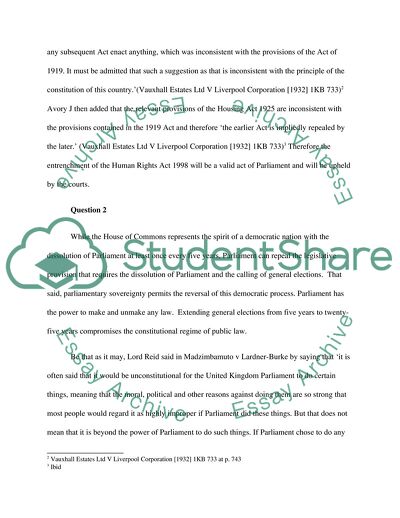
- Home
- Free Samples
- Premium Essays
- Editing Services
- Extra Tools
- Essay Writing Help
- About Us
- Studentshare
- Subjects
- Miscellaneous
- Constitutional law
Constitutional law - Essay Example

- Subject: Miscellaneous
- Type: Essay
- Level: Undergraduate
- Pages: 4 (1000 words)
- Downloads: 0
- Author: nina50
Extract of sample "Constitutional law"
In other words, Parliament is omnipotent and cannot protect its own enactments from subsequent repeal. An earlier Act of Parliament can always be nullified by a later act of Parliament. In Ellen Street Estates Ltd v Minister of Health, Justice Maugham said that ‘the Legislature cannot, according to our constitution bind itself as to the form of subsequent legislation, and it is impossible for Parliament to enact that in a subsequent statute dealing with the same subject-matter there can be no implied repeal’.
(Ellen Street Estates Ltd. V Minister [1934])1 The doctrine of implied repeal applied in the case Vauxhall Estates Ltd V Liverpool Corporation. The Acquisition of Land (Assessment of Compensation ) Act 1919 on the Housing Ac t 1925 applied. Section 7(1) of the 1919 Act was wording in such a way that it purportedly had a binding effect on future Parliaments. Avory J ruled that ‘we are asked to say that by a provision of this Act of 1919 the hands of parliament were tied in such a way that it could not by any subsequent Act enact anything, which was inconsistent with the provisions of the Act of 1919.
It must be admitted that such a suggestion as that is inconsistent with the principle of the constitution of this country.’(Vauxhall Estates Ltd V Liverpool Corporation [1932] 1KB 733)2 Avory J then added that the relevant provisions of the Housing Act 1925 are inconsistent with the provisions contained in the 1919 Act and therefore ‘the earlier Act is impliedly repealed by the later.’ (Vauxhall Estates Ltd V Liverpool Corporation [1932] 1KB 733)3 Therefore the entrenchment of the Human Rights Act 1998 will be a valid act of Parliament and will be upheld by the courts.
While the House of Commons represents the spirit of a democratic nation with the dissolution of Parliament at least once every five years, Parliament can repeal the legislative provision that
...Download file to see next pages Read MoreCHECK THESE SAMPLES OF Constitutional law
Constitutional Law: Eminent Domain
Information on Constitutional Law
EU Constitutional Law Issues
Forum 5 constitutional law
Constitutional Law: Arrest
Administrative and Constitutional Law
Constitutional Law: Kable Doctrine
Australian Federal Constitutional Law

- TERMS & CONDITIONS
- PRIVACY POLICY
- COOKIES POLICY